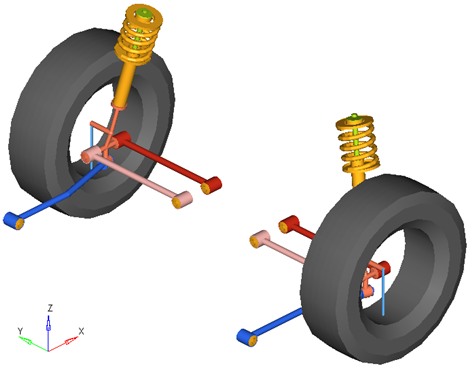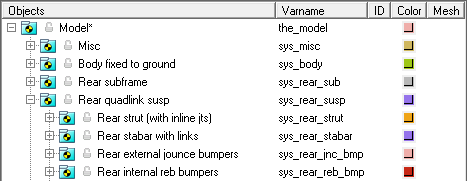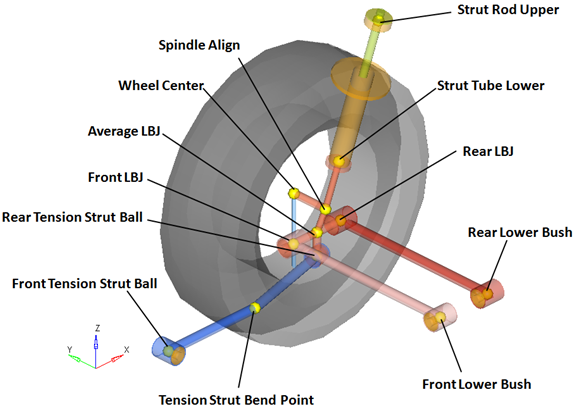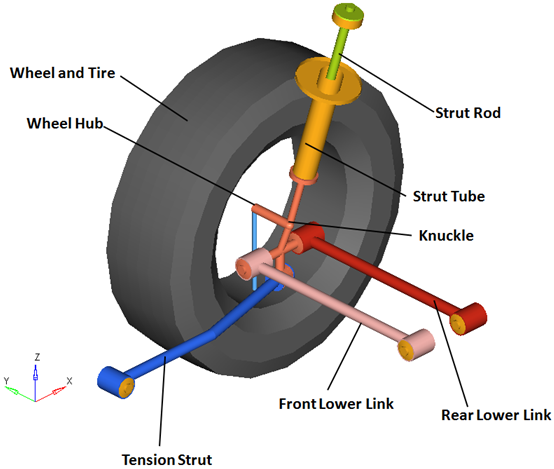Rear Quad-Link
The rear quad-link suspension derives its name from the fact that it is made up of four links. The rear quad-link suspension contains three individual links in tension compression and a strut. This suspension offers flexibility to the designer when determining individual handling parameters, and it is generally used on cars and light trucks.

In conventional designs, the strut is connected to the knuckle and is load bearing (and carries most of the load). The links on the other hand, help in determining suspension geometry and carry much less load.
Figure 1. Rear Quad-link SuspensionModel Use
- The wheel body represents the mass and inertia of the tire and the rim.
- The wheel hub body represents the mass and inertia of other rotating bodies such as a brake rotor, but not the half-shafts if the suspension is driven. The wheel hub and brake rotor have no associated graphics.
- The wheel and wheel hub parts use the Wheel CG location as the center of gravity.
- Each body’s Center of Gravity (CG) is estimated from the body’s geometry. The formulas are coded into the point panel and can be seen via the graphical user interface. If more accurate CG locations are available they should be used.
- A wide variety of combinations of suspensions and subsystems can be built using the
Assembly Wizard. You are encouraged to build systems and
understand the resulting model using the graphical user interface.
When building a new suspension model, build the model with all of the optional systems (stabilizer bar, etc) included in the model. Immediately turn off the systems using the Project Browser and run an analysis on the base suspension to ensure it solves properly. As data becomes available for the optional systems; activate those systems and populate them with data.

Figure 2. Rear-Half-Vehicle Model Employing a Quad-link Suspension

Figure 3. Browser View of a Rear-Half-Vehicle Model Systems and Subsystems Employing a Quad-link Suspension
Attachments
| Entity | Attaches To |
|---|---|
| Front and Rear Lower Links | Default: Sub-frame No subframe: Vehicle body No vehicle body: Ground |
| Tension Strut | Default: Vehicle body No vehicle body: Ground |
Points

Figure 4. Right Side Principal Points – Rear Multi-link Suspension
Bodies

Figure 5. Right Side Bodies – Rear Quad-link Suspension
- The wheel hub body has no associated graphics and therefore is not visible in the image above.
- Optional subsystems may add bodies to the suspension, for example the shock absorber adds two bodies: a shock rod and shock tube. Any bodies added by optional subsystems have been omitted from the image above for clarity.
Bushings and Joints
| Label | Type | Body 1 | Body 2 | Point | Notes |
|---|---|---|---|---|---|
| Front Outer Bush | Spherical | Front Lower Link | Knuckle | Front Lower Ball Joint | When the Compliant option is set to No, the compliance for this joint is turned "Off" and behaves as a pure spherical joint. |
| Rear Outer Bush | Spherical | Rear Lower Link | Knuckle | Rear Lower Ball Joint | When the Compliant option is set to No, the compliance for this joint is turned "Off" and behaves as a pure spherical joint. |
| Tension Strut Front Bush | Universal | Tension Strut | Subframe, Vehicle Body or Ground | Front Tension Strut Ball | When the Compliant option is set to No, the compliance for this joint is turned "Off" and behaves as a pure spherical joint. |
| Rear Tension Strut Bush | Universal | Tension Strut | Knuckle | Rear Tension Strut Ball | When the Compliant option is set to No, the compliance for this joint is turned "Off" and behaves as a pure spherical joint. |
| Wheel Spindle | Revolute | Wheel Hub | Knuckle | Wheel Center | |
| Wheel Hub Fix Jt |
Fixed Joint | Wheel | Wheel Hub | Wheel Center | When the Spindle compliance option is set to Yes, the joint type changes to universal. |
| Lower Front Bush | Universal | Front Lower Link | Subframe, Vehicle Body or Ground | Front Lower Bush | When the Compliant option is set to No, this joint compliance is turned "Off" and behaves as a pure universal joint. |
| Rear Lower Bush | Universal | Rear Lower Link | Subframe, Vehicle Body or Ground | Rear Lower Bush | When the Compliant option is set to No, this joint compliance is turned "Off" and behaves as a pure universal joint. |

Figure 6. Right Side Joints and Bushings: Rear Quad-link Suspension
Similar Suspensions
Front SLA (1pc LCA)
Rear SLA (1pc LCA)
Front Multi-Link
Rear Multi-Link
Front Multi-Link